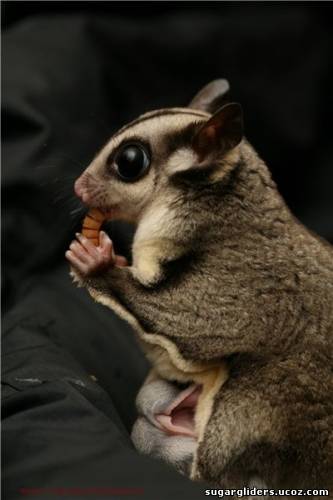Loneliness
Sugar Gliders are community dwellers in nature. They have a real, physical need for close companionship of their own kind, and should not be kept singly. Yes, if you spend hours and hours with your glider every single day, he might seem to be perfectly happy. But even if he is, what happens if you suddenly can't be there all the time? If you had to be in the hospital for week, or unexpectedly go out of town, would there be anyone else who could give your glider the daily attention he needs?
Imagine that you are being taken to another planet, to live there for the rest of your life. You will never again return to earth. You won't even be able to communicate with another human being, let alone see or touch one. The aliens from this planet are very friendly and caring and promise to take good care of you and spend lots of time with you every day, and provide for all your needs.
Can you honestly say you could be happy there without the companionship of another human? For the rest of your life? Humans also have a high need for companionship of their own kind, so it really shouldn't be that difficult for us to understand this same need in gliders, should it?
Please don't buy one glider to save yourself money. Having two won't prevent them from bonding with you, and in fact will reduce their stress level so they can bond with you better. Two won't cost any more to take care of than one, they're just as easy to carry around with you, and they're twice as much fun. And if you can't be with them for any reason, they still have each other.
Hind Leg Paralysis
Sugar gliders are prone to some conditions that cause paralysis of the hind end, causing them to drag their back legs, and ultimately leading to death. Often it seems to be related to calcium deficiency, which causes loss of bone mass and broken bones (particularly the hips). It can also happen in times of stress, such as when a glider moves to a new home.
Necropsy showed areas of bacteria overgrowth in the intestines, which is often caused by stress. As part of my glider's diet now I give them apple cider vinegar in their drinking water. One of the many benefits of this is that it acidifies their digestive tract, making it less inviting to these types of bacteria. I also give them occasional doses of Bene-Bac, which contains "good" bacteria cultures that help to combat the overgrowth of opportunistic "bad" organisms.
Blindness / Cataracts
In another article in the August 1994 issue of Exotic Market Review Linda Watkins told about her discovery that overweight mothers can produce offspring that have white eyes, or white spots "floating" in their eyes. The ones with white eyes were completely blind. Her vet determined that the white was fat buildup, and she felt it is probably due to too much fat in the mother's diet.
In a July 1995 article she also talked about babies born with "white" (no black tip) tails. For some reason, these babies seemed to develop cataracts when they get older. Linda found that feeding the parents diluted (half water) carrot juice every day until the baby was weaned seemed to help prevent the cataracts from developing. The babies were given the carrot juice until at least a month after weaning.
UPDATE There are subspecies of gliders (Petaurus breviceps ariel, I believe) that have white-tipped tails. I doubt it was really linked to blindness, more likely her gliders had some ariel bloodlines!
Депрессия:
Это состояние поссума, характеризующееся сниженным настроением, подавленностью и апатией. У поссумов депрессия может привести к развитию психических расстройств, самокалечению и смерти. Постоянное глубокое депрессивное состояние, потеря интереса, отсутствие удовольствия от нормальной деятельности, апатия, изменения режима сна, отсутствие аппетита – все это признаки депрессии или психического расстройств
Обезвоживание:
Обезвоживание случается, когда в организме не хватает жидкости для нормального функционирования. Обезвоживание в любой форме представляет опасность для жизни, однако оно излечимо, если вовремя заметить его симптомы.
Многие фрукты, овощи и источники протеина, входящие в рацион поссумов, имеют пониженное содержание кальция относительно фосфора, и по этой причине у поссумов может образоваться недостаток кальция в организме, что, в свою очередь, может привести к параличу задних конечностей – заболеванию, которое может оказаться смертельным.
Запор:
Заболевание характеризуется замедлением перистальтики кишечника, малым количеством кала, его повышенной твердостью и сухостью, При опорожнении кишечника возможны боли.
Диарея:
Изменение частоты и консистенции стула. В случае слабой диареи стул мягкий или кашицеобразный, в случае сильной диареи – жидкий или водянистый.
Закупорка желудочно-кишечного тракта
Частичная или полная механическая закупорка тонкого или толстого кишечника. Как правило, такое случается, когда в организм поссума попадает инородное тело (такое как кусочки дерева, семена или просо), закупоривающее кишечник.
Паралич задних конечностей
Паралич задних конечностей (ПЗК) не является заболеванием сам по себе, это симптом вторичного гиперпаратиреоза, развивающегося в результате отрицательного кальциевого баланса. При этом заболевании организм старается поддержать уровень кальция в крови за счет его освобождения из костной ткани. При отсутствии лечения заболевание смертельно, однако при надлежащем лечении во многих случаях этот процесс обратим.
Стресс
Состояние стресса является реакцией организма на неблагоприятные условия среды или давление. Для поссумов стресс может быть смертельно опасен.
Самокалечение
В основном самокалечение поссумов выражается в том, что они кусают сами себя в области половых органов и ануса. Причиной такого поведения может стать грязь или царапина в области половых органов, инфекционное заболевание мочевого тракта, бактериальная инфекция, физические дефекты; иногда установить причину самокалечения не удается. В этом состоянии поссумы могут нанести себе смертельные повреждения. При самокалечении поссум издает характерные звуки, не похожие на обычный скрежет или тявканье.


